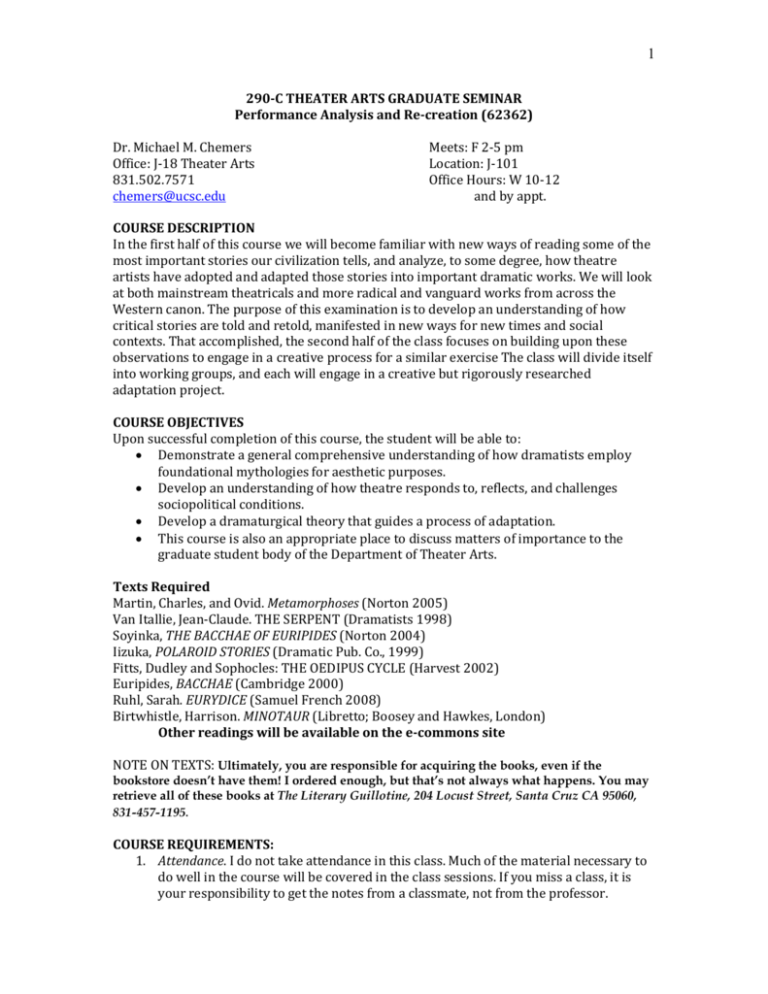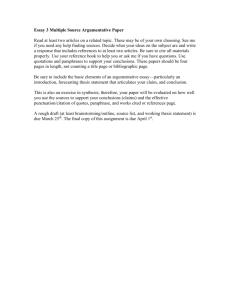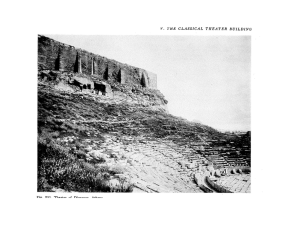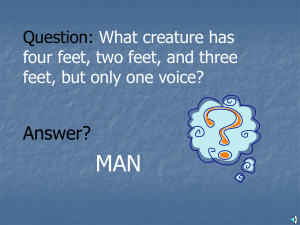290-C - UCSC Committee on Teaching
advertisement

1 290-C THEATER ARTS GRADUATE SEMINAR Performance Analysis and Re-creation (62362) Dr. Michael M. Chemers Office: J-18 Theater Arts 831.502.7571 chemers@ucsc.edu Meets: F 2-5 pm Location: J-101 Office Hours: W 10-12 and by appt. COURSE DESCRIPTION In the first half of this course we will become familiar with new ways of reading some of the most important stories our civilization tells, and analyze, to some degree, how theatre artists have adopted and adapted those stories into important dramatic works. We will look at both mainstream theatricals and more radical and vanguard works from across the Western canon. The purpose of this examination is to develop an understanding of how critical stories are told and retold, manifested in new ways for new times and social contexts. That accomplished, the second half of the class focuses on building upon these observations to engage in a creative process for a similar exercise The class will divide itself into working groups, and each will engage in a creative but rigorously researched adaptation project. COURSE OBJECTIVES Upon successful completion of this course, the student will be able to: • Demonstrate a general comprehensive understanding of how dramatists employ foundational mythologies for aesthetic purposes. • Develop an understanding of how theatre responds to, reflects, and challenges sociopolitical conditions. • Develop a dramaturgical theory that guides a process of adaptation. • This course is also an appropriate place to discuss matters of importance to the graduate student body of the Department of Theater Arts. Texts Required Martin, Charles, and Ovid. Metamorphoses (Norton 2005) Van Itallie, Jean-Claude. THE SERPENT (Dramatists 1998) Soyinka, THE BACCHAE OF EURIPIDES (Norton 2004) Iizuka, POLAROID STORIES (Dramatic Pub. Co., 1999) Fitts, Dudley and Sophocles: THE OEDIPUS CYCLE (Harvest 2002) Euripides, BACCHAE (Cambridge 2000) Ruhl, Sarah. EURYDICE (Samuel French 2008) Birtwhistle, Harrison. MINOTAUR (Libretto; Boosey and Hawkes, London) Other readings will be available on the e-commons site NOTE ON TEXTS: Ultimately, you are responsible for acquiring the books, even if the bookstore doesn’t have them! I ordered enough, but that’s not always what happens. You may retrieve all of these books at The Literary Guillotine, 204 Locust Street, Santa Cruz CA 95060, 831-457-1195. COURSE REQUIREMENTS: 1. Attendance. I do not take attendance in this class. Much of the material necessary to do well in the course will be covered in the class sessions. If you miss a class, it is your responsibility to get the notes from a classmate, not from the professor. 2 2. Reader Responses. For THREE of the plays we read, you will craft a response paper of no fewer than 1,250 words (5 pages). You choose the plays. The specific topic of the paper is up to you, but you will be graded on how well you incorporate the ongoing class discussions, history, and theoretical works we read into your response. I am looking for evidence of your ability to critically engage with the material you read. You will also be graded on clarity and style, which are professional practice skills in whatever field you may pursue. Consider this a research assignment: pose a question and answer it (see below). Do not summarize the reading. Do not narrate your personal feelings about the reading. It is very likely that you will be given your first submission back to be revised and re-graded, you lucky devils. 3. Adaptation Project. The class will be divided into teams and choose a story from Ovid’s Metamorphoses, which they will then adapt into a new play, to be performed in the final days of the class. As the project forms, objectives for adaptors include: 1. What was the social/political context of the earliest known telling of the myth? 2. What story can we tell that is indicated or adumbrated by this text but relevant for a modern audience (WHY THIS PLAY NOW)? 3. What aspects of the original storytelling context are to be enhanced, and what discarded? How do we create a new, single storyline on this pattern? 4. How can we adapt outmoded tropes and narrative conventions to a modern performance sensibility? 5. How do we express these notions in design? 6. What new innovations can come from this basic source material? Adaptation teams will ultimately provide a script of 15-20 minutes’ length, and a summary of the adaptation process. Concept teams will provide visual referents as per a typical design launch presentation, including a storyboard if necessary and a summary of the production concept in general and design concepts in particular. These will be presented in the final weeks of class. GRADING Responses (x3) Participation Final Project TOTAL 300 100 100 500 450-500 400-449 350-399 300-350 A B C D 3 SCHEDULE OF CLASSES (subject to change) WEEK ONE 1.9 Read: Doty, Chapters 2 and 3 [ecommons]. Discussion: Myth and Society WEEK TWO: 1.16 Read: Roach, Ch 1 and Conquergood, “Hmong Shamans” [ecommons] WEEK THREE 1.23 Genesis 2, 3 [ecommons] and Van Itallie, The Serpent WEEK FOUR 1.30 Read: Graves, “Theseus” [ecommons] and Bertwhistle, Minotaur WEEK FIVE 2.6 Read: Graves, “Oedipus” [ecommons] and Sophocles, Oedipus at Colonus WEEK SIX 2.13 Read: Euripides, Bacchae, and Soyinka, The Bacchae of Euripides, inc. the intro WEEK SEVEN: 2.10 Read: Eco, “The Comic and the Rule” [ecommons] and Iizuka, Polaroid Stories WEEK EIGHT: 2.27 Read Chemers, “Wild and Untamed Thing,” [e-commons] and watch Rocky Horror on your own if you haven’t already. LAST DAY TO HAND IN RESPONSE PAPERS. WEEK NINE: 3.6 Read: Ruhl, Eurydice. WEEK TEN 3.13 Read: Chaudhuri, Una. “Working Out (of) Place: Peter Brook’s Mahabarata and the problems of intercultural performance”* Your final projects will take place during the final exam time: June 11, 4-7 pm * This entire article is available on Google Books’ Staging Resistance: essays on Political Theater, pp 77-97. 4 HOW TO GET AN “A” ON YOUR WRITING Papers are graded according to four major criteria, and evaluated against four categories of sophistication: Theoretical Groundwork Use of Evidence Organization Clarity and Style Not Yet Competent Does not indicate the author understands the theories used Evidence is weak, does not support theory, or is not properly analyzed. Citations systematically incorrect Argument poorlyconstructed or difficult to follow Systematic grammar or spelling errors, lack of competency with written language Competent Demonstrates a reasonable grasp of theories used Sophisticated Demonstrates a critical understanding of theories used Uses good but Judicious unoriginal selection of evidence, makes evidence, correct but critical use of basic or wellevidence, deep known analysis, conclusions. complete and Citations murky correct citations or sporadically incorrect Logical flow, step-by-step analysis, clear, coherent argumentation. Awkward writing, sporadic errors, lack of grace or fluidity in writing Excellent grammar, spelling; communicates all ideas clearly with a minimum of jargon Masterful Adds something new to general understandings of the theories used Uncovers something unknown or unexamined by the general scholarship on the subject Argument appears to flow “naturally” or “organically” Writing particularly elegant, funny, or otherwise aesthetically pleasing (without compromising argument) The level of “Masterful” reflects the ability I would expect from an accomplished, publishable scholarly work. It is not necessary to achieve mastery in all four categories to get an “A” on your paper, but it is a level for which you should strive in all your writing. 5 FAQ When’s the best time to talk to the professor? Just before or just after classes are terrible times to talk to me. Come to my office hours or email to schedule an appointment. Do you check email? Yes, but it’s not my religion. On weekdays, during the working day, I will usually respond before the end of the day. I do not regularly check email on weekends or evenings, so if you email me at midnight with an urgent message, I will not see it until the following morning, and a Saturday email may go unread until Monday. Please follow up and confirm all messages sent via email. Can I submit my papers by email? No. Please submit all assignments, cleanly printed, to the appropriate person in class on the day the paper is due, or in the prof’s mailbox if you have permission to do so. Do you accept papers late? Sure. But there are consequences for substandard behavior. For every day you are late with an assignment, your grade on that assignment will drop by a factor of one (A to B, B to C, etc), even if you have a really, really good excuse, like your printer is broken or your computer crashed. Yeah, like THOSE are good excuses. Will you offer personalized tutoring in writing? I can help you learn how to craft a sophisticated, brilliant, incisive, complicated, eventually even publishable argument about theatre history and dramatic literature, but I expect you to know already how to spell, punctuate, write a grammatical sentence, organize an essay, cite evidence, make transitions between paragraphs, and all of the other basic mechanics of essay-writing taught in high school. If you need remedial help in writing and research, GET IT. Visit this website: http://www2.ucsc.edu/lss/. They can help you get a tutor, and they offer special skills courses. Also, check out this website: http://www.cmu.edu/styleguide/ for a guide to writing fluently and clearly. How do you feel about cheating? The official UCSC policy governing Academic Integrity is available at http://www.ucsc.edu/academics/academic_integrity/. Suspected cases of plagiarism or other cheating will be handled strictly according to those policies. If you have any questions about what exactly constitutes plagiarism, readhttp://www1.ucsc.edu/academics/academic_integrity/ undergraduate_students/resources.html and talk to me. No behavior that constitutes cheating, plagiarism, or any form of misconduct (including submitting a paper to me that has been submitted to another class) will be tolerated in this class for any reason. If you get caught, in other words, you automatically receive an “F” for the class and may no longer attend the class sessions. In addition, the professor may choose to pursue more stringent academic disciplinary action, which may include your expulsion from the university. Come on, not really? Really. Cheat and fail. What if I have a disability that might affect my class work? The University of California and this professor are committed to providing an equitable learning environment for all students. If you require special accommodations, please get an Accommodation Authorization from the Disability Resource Center (DRC) and 6 submit it to me within the first two weeks of the quarter. Contact DRC at 459-2089 (voice); 459-4806 (TTY); drc@cats.ucsc.edu; or http://drc.ucsc.edu/ for more information on the requirements and/or process. What if I have personal problems that interfere with my work? College is stressful, and stress is psychologically damaging; nevertheless, we all have to find ways of coping to complete our work. If you feel yourself getting overwhelmed emotionally, please contact: • Counseling and Psychological Services (831) 459-2628. Hours 8:00am to 5:00pm, Student Health Center, East Wing 2nd Floor. If you feel that your emotional condition may interfere with your work, please make whatever arrangements you require and make sure to inform one of us as soon as possible. What if I need to take time off for religious observance? I will make all reasonable accommodation if any events in the schedule conflict with your religious creed. You must make any request for such accommodation to me directly within the first two weeks of the term. Extra credit? Don’t even ask. STRUCTURING A RESEARCH PAPER Your professor can help you at any stage of this process. Take advantage of us: that’s what we’re here for. Process: 1. Pick a topic that interests you. You can use the list given in the syllabus, or follow your bliss. A TOPIC is a broad category of research. Drugs in Ancient Athens. Human Sacrifice and Dionysianism. Shamanistic antecedents to modern performance. Women in Greek theatre. Shame vs. Guilt in Aeschylus. Food in Sophocles, etc. 2. Research your topic. Read some encyclopedias to get going, do a google search, browse around, speak to a reference librarian. Get a stack of books (books are those things that are kind of like websites but don’t have a URL). 3. As you learn more about your topic, you can begin to formulate a THESIS QUESTION. Why didn’t women perform in Ancient Greek Theatre? Why wasn’t human sacrifice outlawed in Athens until 500 bce? What was the impact of war on the themes of Aeschylus? Why are Aeschylus’ plays so different from Euripides’? 4. Now you can start trying to answer the question by doing specific reading tasks. Whenever you find a new book on your topic, go straight to the index and do a quick scan of relevant topic headings (“Women in drama,” for instance). Collect enough information to give you a general idea of what people think the answer to your question was. 5. Ask yourself a tough question: Does everyone agree? If every author you read agrees on the answer to your question, you have either picked an insufficiently complex question (meteorologists agree: the sky is blue) or you haven’t done enough research. FIND CONTROVERSIES. 6. Begin evaluating your evidence. Is it primary, secondary, or tertiary? Is your author a respected scholar with a track record of good publications, or some nutjob with a website? Whose arguments are the most compelling? Whose are most based on evidence? Is one emerging as the most rational? Or do you need to generate your own theory to answer the question? 7. Now you can begin to formulate your argument around the answer to your thesis question. The answer is your THESIS STATEMENT, which reads like this “Intoxicating substances played a major role in the formation of classical theatre 7 practice.” Or “The Greek theatron possessed a canopy and possibly even a flysystem.” Or “Ancient Greek Women did have the opportunity to perform as hetaira (performance prostitutes).” Or “Indian sanskrit theatre may actually have been Greek in origin.” 8. Now structure your paper: • The first section of your paper assembles and summarizes the evidence you are looking at (historical accounts, playtexts, postholes, whatever). Cite all of your sources. • The second section of your paper presents a theory for explaining that evidence. You uncovered this theory in your research. Explain the strengths and weaknesses of the theory. Cite your sources. • The third section of your paper presents a different theory you uncovered in your research. Cite, cite, cite. • Once you have described two or three solid theories explaining your evidence, the next section of your paper provides an analysis of the theories, in which you have DEDUCED the best one. • Now, write your conclusion. In your final paragraph, tie your research in to the larger questions we discuss in this class. How does your research help us understand theatre better? • Now, write your introduction. Make it a road map: Ask your thesis question, then say: we are going to look at THIS evidence, THESE theories, and come to THIS conclusion, which is THESIS STATEMENT. So here’s a paper with a single sentence for each section described above: • • • • • • • • THESIS Q:If the ancient Greek theatre had no flysystem, what are those postholes for? THESIS STATEMENT: The postholes indicate a flysystem. INTRODUCTION:This essay will explore the most recent theories that suggest the Greek theatre did indeed have a flysystem. EVIDENCE SUMMARY: There are postholes on the stage, there is evidence of the firetreatment of ash trees, and there are three plays that seem like they could require a quick scenic change. THEORY I. Dr. Jane Jibberjabber says these things mean there was certainly a flysystem. THEORY II. John Jingleheimer says it’s just a coincidence. THEORY III. Jibberjabber’s theories are actually supported by a new thesis by Johann Jackolantern who excavated a new site and found the same thing. CONCLUSION. In the end, it seems very likely that there was a flysystem. If there was, we’re really going to have to re-examine our deeply-held prejudices about the technical sophistication of the Ancient Greeks. COMMON WRITING MISTAKES • • AVOID USE OF FIRST PERSON. Don’t narrate your process. Don’t tell me how much research you did or how surprised you personally were to discover something. There are times when it is appropriate to use first person, such as when you are revealing your bias or methodology. Generally it is assumed that you are the person who wrote the paper, so it doesn’t need to be reinforced. DON’T CITE ENCYLOPEDIAS OR DICTIONARIES. Including Wikipedia. This is highschool-level research. Go deeper. 8 • • • • • • • • • • DON’T EDITORIALIZE. “This is cool, this sucks,” etc. Present evidence, and let research guide your evaluation. Let your reader decide what’s cool. Otherwise it’s like telling a joke onstage and then turning to the audience and saying “that was funny, you should laugh.” AVOID REDUNDANCY AND EXTRANEOUS MATERIALS. It is good to signpost, occasionally summarize your argument for reading clarity, but don’t just rephrase what you’ve already said to fill up space. Also, make sure everything you include in your paper is relevant to your thesis. BALANCE. Your arguments need to be challenged: don’t just give me one side, let’s hear the opposition! If there isn’t any opposition, you’re probably not investigating a subject deeply enough. If everyone agrees on what you’re saying, why bother telling it to me? EXPLAIN: Envision your audience as a very articulate, super-genius four-year old who has never read anything you are describing. Explain each step of your reasoning, who you are citing and why, and why what you’re saying is relevant. USE EVIDENCE. Back up your claims. Don’t say “this character feels this” without including a quote that demonstrates it. Same with historical data. TRANSITIONS: One main idea per paragraph, please. Finish your thought, then tell me how that thought leads to the next one. The goal is a clear structure, not a pile of haphazard ramblings. DON’T QUOTE IN YOUR OPENING PARAGRAPH. State your thesis in a reasoned way, and then bring in the evidence to prove it. The first voice we hear should be your own. PARAPHRASE WHERE POSSIBLE. Don’t use quotes if a summary of an idea in your own words (properly cited, of course), will do. Quotes are to add impact and authority, and sometimes if they use interesting language you want to repeat you can use them. Don’t overburden your paper with them, though! 20% MAX! MINUTIAE: Polytheism: “gods,” not “Gods.” Play titles are italicized, characters and authors are not. Write out all numbers less than 100 (forty-nine, not 49) except when citing page numbers. CITE PROPERLY AND FRAME YOUR QUOTES!!! Don’t do this: Women in ancient Greece were not permitted onstage. “The public sphere was the domain of men, while women were relegated to the domestic sphere of the home and hearth” (Arglebargle 92). This shows that women were discriminated against. This is insufficient. If you’re telling me the Greeks were sexists, what specifically is sexist about that quote? The quote is just floating there in space: I don’t know exactly what the author wants me to take from it. There’s a lot of information in that little quote. Which parts of it should I be looking at? Here’s a better way of framing that quote: Women in ancient Greece were not permitted onstage. The reason for this, as James Arglebargle has argued convincingly, was that “the stage was considered part of the public sphere, the domain of men, while women were relegated to the domestic sphere of the home and hearth” (92). Certainly, this division of the Greek world into masculine (public) and feminine (domestic) spaces represents a sexist ideology that would impede women’s participation in the Athenian Drama Festival throughout the Golden Age. Note that the author didn’t use (Arglebargle 92), only (92). This is because it is clear from the sentence that Arglebargle is being quoted. 9 * * * Below I have written a (fake) example of how to cite in different ways. Please note the relationship of the citations to the works cited, and how easy it is to trace the source of the quotes in each example. The worship of Dionysos in ancient times has been described as “a cute little orgiastic drug cult” (Frogbottom 45). Michael M. Chemers, however, describes it more colorfully as: A war against the oppressive controls of the new Athenian state. The worshippers of Dionysos (a feminized male god who broke down boundaries) could profitably rebel against the city of Athena (a masculinized female god of order), and they could do it in a really funky way, no doubt, oh yeah, it’ll blow your mind, man (22-3). The implications of this statement on the study of Greek aesthetics are profound, but that didn’t prevent Ronald McDonald in 2004 from referring to Dr. Chemers as “a whacko of monumental proportions” (54), nor was Chemers’ insightful analysis ultimately able to keep him out of prison (McGee). WORKS CITED Chemers, Michael M. Old-Time Religion: the Need to Institute A Dionysiac Cult in University Drama Programs. Boston: Catastrophe Press, 2002. Frogbottom, Irving. Nibbles Goes to the Phalloi; Readings in Ancient Greek Cuteness. New York: Vicious & Sons, 1999. McDonald, Ronald. “Why a Brilliant Professor Went Insane and Became a Priest of Dionysos With All Those College Kids.” Scandals in Drama 22:3 (Summer 2004), 29-55. McGee, Stinky. “State Charges Professor in CMU Scandal.” Pittsburgh Post-Gazette, 6 Nov 2004, A-3. HOW TO EVALUATE A WEBSITE • • • • • One of the most difficult aspects of research is evaluating the scholarly content of a website. What is missing in a website is PEER REVIEW: if you want to get published in a scholarly journal or by a university press, your manuscript must be read by several people who are experts in your field, and can only go to press after they give you the thumbs-up. The internet has no peer-review, so no one gets to decide what the content of a website should be apart from its author. Peer review is designed to ensure that the argument is clear, balanced, relevant, deductive, empirical, and rational. An internet source ought to meet the following criteria to be considered scholarly: o Be peer-reviewed (outside scholars must have been consulted in its editorial and publication process) o Present a balanced argument supported by research and evidence. o Employ traceable citations. Internet sources that are digital copies of scholarly journals (like Jstor.org) count as normal print sources, and are great to use. Also Google Scholar is getting better. Online databases and archives like the Perseus Project that are administered by scholars and universities (.edu) are generally great to use: see the appendix of the syllabus for a good list of online sources like these. 10 • • • • Government sites (.gov or .mil) that contain surveys and studies are usually okay, but you should treat them with a healthy suspicion. Governments may not always have your best interests at heart. And there’s no Easter Bunny, either. The main purpose of a commercial website (.com) is to make money. Generally, you should not trust any information garnered from such sources. Big corporations may not always have your best interests at heart. And the Tooth Fairy is a myth, as well. Online encyclopedias (like Wikipedia) are usually great places to START your inquiry, but do not use them as source material. Find THEIR sources and examine them. The best encyclopedia articles list sources at the end of the text. Don’t MAKE me tell you about Santa Claus. Blogs and .org sites are partisan mouthpieces: they are accountable to no one. Be suspicious of everything you find there. Fact-check and verify.





